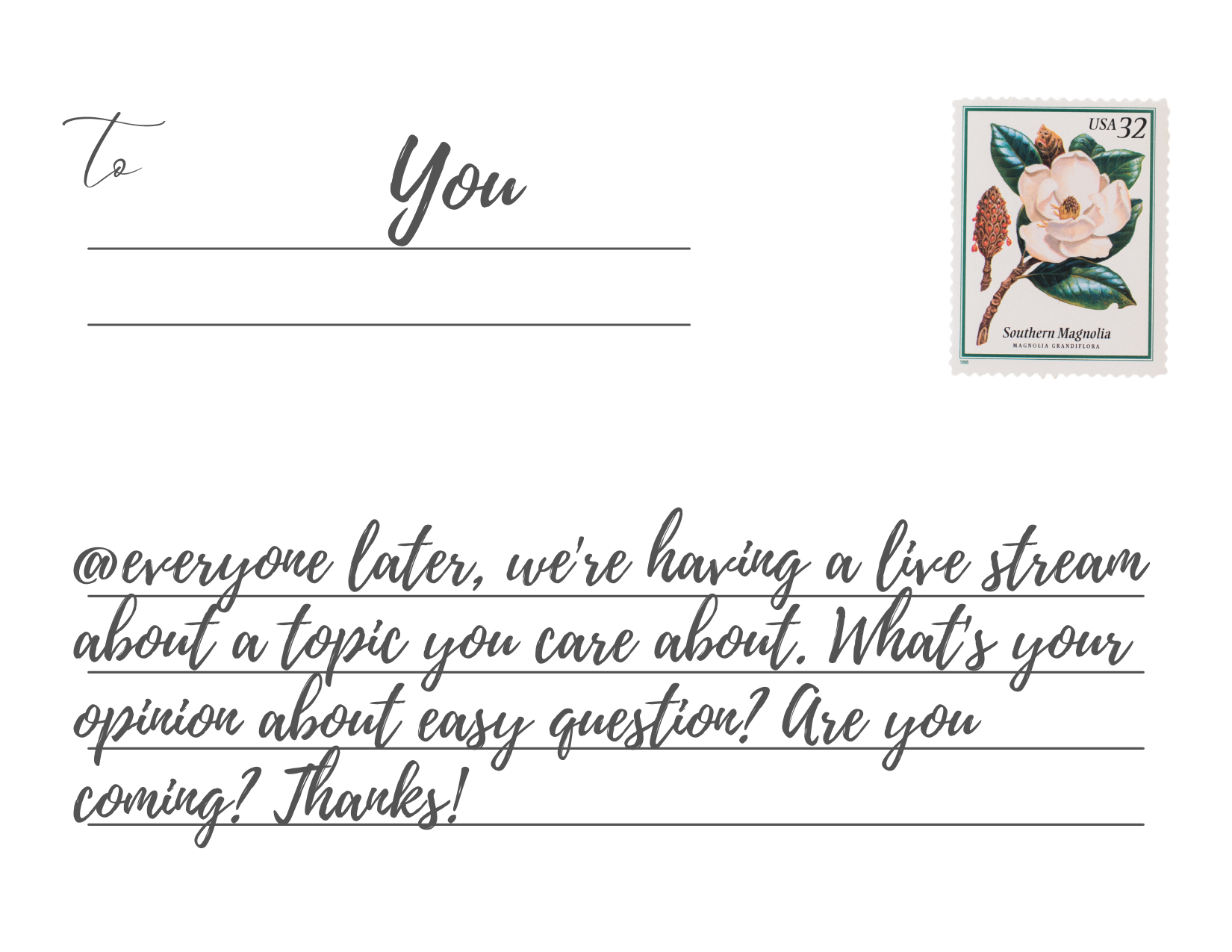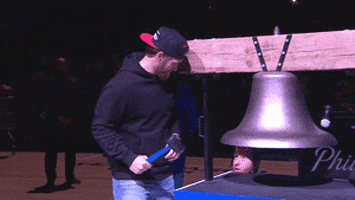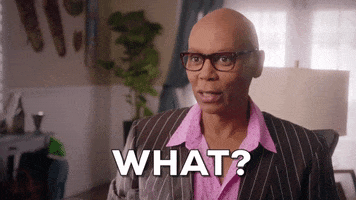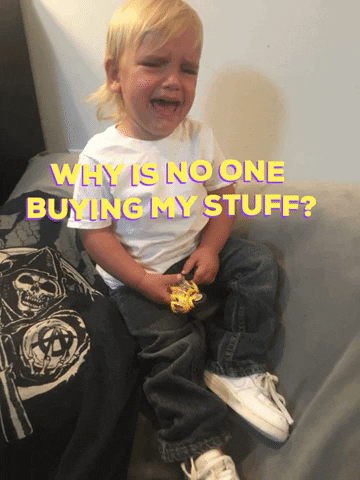Using the @everyone tag
I recently posted on my FB Profile:
Darling, joining my community 16 days ago, then commanding me on how to run things hardly endears me to your point of view.
And it's why I built The Coach's Plaza in the first place.
To coach someone is an honor.
And frankly, there are a lot of people who would just *love* to get paid to have nice conversations each day that aren't yet ready for the responsibilities associated with business ownership and leadership.
Understanding influence, and handling the delicate balance of ensuring the client is always in charge of their own agenda, while at the same time challenging their limiting beliefs takes more than a solid understanding of influence.
Coaching is not an easy street to make a buck.
In fact, it's hard as hell.
People (rightly so) are skeptical of coaches, and their credibility.
So if your "influence skills" include issuing commands to strangers and not pausing to understand the dynamics of the room that you're in, that's likely pointing to a lack of readiness for coaching or consulting at a high level.
If it includes blaming everyone else for your life experiences, then it points to a need to continue to work on your leadership and self-leadership before you coach a lot of other people.
Coaching is not a cash grab.
It's a deep relationship that can make a massive difference to the performance of the client, when it's done well and responsibly.
I love working with coaches on marketing and sales, because really, I'm working on *coaching and leadership skills* - at the end of the day we're talking about influence, self-leadership, performance, and how to engage a conversation effectively.
When a coach nails it on mastering the art of influence in a way that is aligned to their ethics and authentic self-expression, there's this ease and relaxation that goes into their leadership style..
Along with their success financially, of course.
And so no, I'm not going to stop using the @everyone tag once per week to notify of new trainings. 🤣
The social media nerds keep coming out with new features, and this humble servant of a mission for more joy and full authentic expression in the world believes this:
If you have a purpose to serve people with more joy, more fulfillment, and a vital transformation - then dang it - use those new bells to ring loud and clear your message!
Now, will there be more noise coming back at you?
You betcha.
Consumers (i.e. people who are vegging out and consuming social media, reading emails, surfing the Internet) like to be in control of their experience.
That's why we all got so excited when DVRs came out and we could skip the commercials.
And why although we like to complain about paying for subscriptions, we're happy to, so that we can stream content on demand (i.e. Netflix, Prime, etc.)
But ever since the newsletter was invented (the first known US newsletter came out in 1704, so we're talking a three HUNDRED-year-old technology), people have been using content to share a message with an advertisement on it.
Getting attention to sell is not a new idea.
Finding new ways to get that attention, well, that's a little more fun.
Why The @everyone Tag Is Great!
In May 2022 Facebook introduced the @everyone tag feature in some groups and has continued rolling it out since.
Up to once per day, you can tag every member in the group with a post or comment that says "So and so just tagged you and others..." and it is great because organic reach for posts from groups has been declining.
Yup.
Groups are still a wildly effective tool for engaging your community as a coach, and we still recommend it as a part of the systems that we teach, however, we've noted a marked decrease in reach of all post types inside of Groups .
The @everyone tag has been the first feature release by Meta in a looooooong time that has tipped the scales back in the favor of increased engagement, and that's a very good thing... but...
Marketers Ruin Everything. Especially lazy ones.
The life cycle of great new features is this:
- A new way to engage your audience comes out (ahem, remember Clubhouse? Yeah, me neither)
- Everyone freaks out at how amazing it is (novelty!!)
- Everyone jumps at it and rushes to the gold
- People get really annoyed at how saturated and busy it is, and the novelty wears off quickly, and no one is doing anything special with the new thing, so...
- People decide the new thing sucks
- So they stop using the thing, and throw the "baby out with the bath water" even if the new thing has some super redeeming capabilities, so we just stay in the stone ages with our tech. Boo.
When what REALLY happens is people don't use their imagination with new technology very often...
The "lazy" way that people have used the @everyone tag far too often is to just slap the tag in a comment on an already unimaginative piece of content.
When *other* marketers are lazy, the consumer doesn't care that it's not *you*, they're just annoyed, and assuming that *you're also a lazy b*stard*!!
Gosh, isn't it fun to be found guilty without a trial?
Seriously though, when you're marketing your coaching business and curating your brand, the factors that are influencing your leads aren't just you.
They're not just in your group.
They're probably in dozens (if not hundreds) of other groups, and getting pinged by all those other notifications.
So here's what we've figured out about the @everyone tag that seems to be working pretty well for us:
Be more imaginative with your marketing...
If you received a piece of mail, would you want it to be like this:

Or would you prefer it to be more like something like this...

Okay, so obviously there'd be a little more context for the question, but hopefully you get my point...
When we're cruising social media, we don't want to have to "search for" the information when you tag us. We just want the information RIGHT THERE.
And if you can ask an easy to answer question, that's even better.
And if you can say something that makes me look good on social media, that's even better!!
You see, the problem isn't the "@everyone" tag, the issue is that most people that are aggressively marketing online aren't really marketing, they're just making a lot of noise, and it's annoying people.
So what can I do if I'm going crazy with the @everyone tag thing?
Firstly, you can decide what you want to do for your own marketing.
That's my favorite, because you can always influence you, right?
Secondly, you can share this article with someone as an idea of how to use the tag in a way that engages a conversation.
Thirdly, in our community, www.thecoachesplaza.com we have several recent trainings that are discussing community based marketing that would help a lot - because often people don't mind being tagged if they feel that it's a part of something they already care about...
Just hop up to the Guides area inside of the community to peruse our most recent trainings, or, if you are a VIP flyer type (that's me), come join us in The Coach’s Plaza Club, where you can search transcibed versions of the trainings and get the downloaded slides with each training.
The Bottom Line
Most of the time when we take the stance "I'm not doing XYZ type of marketing", it's for fear of criticism from others that we'll get a negative reaction for doing it.
A positive reframe I'd love to offer you is that you can use virtually any kind of marketing, and have it fit within your brand and value system, if you open up your imagination and put the needs of your client first, and remember: a secret brand that gets no attention won't go far at all!
Using The @everyone Tag
Transcript of Vlog - October 13, 2020
Well, I'm writing a blog in my PJ's and I wasn't going to do a podcast with it, but I couldn't resist. Hey, good morning Amanda here and it is the We Hours and I, I wrote a post on my Facebook kind of about the at everyone tag because so many people are still kind of fired up about this. And it's so funny to me because the tag actually came out in,
I looked it up, it was May and June of 2022. And this is being recorded in October of 2022. And it's still something that people are talking about a lot, but I think it's because it probably took some, some time to gather some steam. And you know, as a coach, an entrepreneur, your, your whole thing is to work with clients and to find people who want your services as a coach.
And this, this at everyone Tag is an awesome, awesome new feature, but you will probably hear some pushback. And so I wanted to talk a little bit about the feature and a little bit about how you can use it in a way that is gonna be beneficial for your coaching brand, but also maybe talk little bit about why there is some resistance about it.
And so you can make a great decision for yourself about how you might wanna use it. But I think it also really points to kind of an issue that a lot of people have with promoting their business even in the first place. You know, at the Coaches Plaza I'm working with coaches who are awesome, you know, they are, they're fantastic coaches.
You know, I get up at the wee hours in the early morning and I'm often working on my business early in the day because I, you know, I've got kids, I've got family, I've got a lot of things going on with my life. So I spend a good amount of my very early morning hours kind of getting things organized and sorted out when,
when it's early. And what I'll tell you about the people that I work with is, is that they are are so dedicated to their craft. They are so intelligent, they are so fixated on doing a very, very good job for the people that they work with. They would be mortified to do a bad job for their client. But at the same time,
excuse me just one second here, I'm gonna pause here. Clear my throat. I'm still getting over some allergies, but at the same time there's a lot of hesitancy that I help my clients work through of, you know, imposter syndrome of feeling like maybe they shouldn't market to their fullest potential and really overcoming a lot of resistance to putting emails out very frequently to advertising their business at all,
to putting things on social media at all. And so this everyone tag controversy really catches my attention because I know what it's like to not wanna put your face on Instagram and not wanna do these things. And now here I am in my PJ's doing a blog. So obviously I've come a long way. So let's talk about it. So what is this everyone tag?
Does everyone have it? How does it work? It's specifically for Facebook groups and I love Facebook groups as being a part of your overall strategy. I don't think it should be your only strategy. I think it should be a part of your strategy. But you know, after being in Facebook groups for the past few years, I've noticed a decline in the reach of posts.
And that just happens, you know, as more and more people start using social media and more and more people are kind of getting out there, supply and demand means that your reach of the posts is gonna go down. So a lot of people are like, Oh, it's the algorithm. It's like, well maybe there's, there's some nefarious algorithm effects that are causing things.
And yeah, sure, I'm sure that there's changes to how the computer does things, but I think there's a lot of effects that cause things like the live video reach has certainly gone down and I know that it's not just me, it's, it's affected my clients, it's affected many of my colleagues, you know, different kinds of posts. Like we actually measure the reach of our posts so we know that there's definitely been a decrease in reach.
So when the everyone Tag came out, the way it works is you can up to once per day and we only do this once per week because we don't wanna be hyper, hyper annoying, but we use judiciously once per week and add everyone tag, which basically has us show up in the Facebook notifications, you know, alongside you've been tagged to you know,
a post and more recently Facebook kind of updated the, the language cuz at first it looked like you were personally tagged on something. Now it says you and others were tagged on something. So I think that that was a really good move by by Facebook to just kind of make it a little bit more clear. But there's like all this controversy about it because people,
consumers like to have control over their consumption experience. I know I do. You know, if, if you remember what it was like back in the day to be able to have access to a DVR for the first time and be able to like skip commercials, do you remember when you couldn't skip commercials and you just had to watch them? Am I like,
am I the only one that remembers that? Right. So yeah, I mean we all wanna have control over our user experience but I also have to say that there's like this, there's this kind of, I guess you could say beautiful tension between getting attention and accommodating that, that consumer desire. You know, I did a little research for this blog post.
Did you know that the first documented known newspaper in the United States came out in 1704 and that was the first documented printed advertisement as well. So that means that, you know, when it comes to advertising your for a business or for TR for commerce in the United States, we're dealing with a technology that's been around for over 300 years. And so, you know,
people getting kind of like upset about things appearing in their feed and, and things, you know, showing up. It's like getting mad that there's junk mail. It's like getting mad that there's a billboard. It's like getting mad that you know, and Facebook is free. You know, the thing is, is that no one is gonna get that notification unless they have joined your closed group.
So the only way they can join your closed group is if they requested to join that group. So they as a grown up, would have to have requested to join that group. And so I personally find it somewhat amusing for someone to be upset about their own consumption experience because they can always leave the group. So what we decided to do is we decided to use this new ability because it's the first time in many,
many months, years arguably that we've had a new feature come out that's actually increased the reach and the engagement after a decline, decline, decline, decline, decline of engagement over the past several months. So, but we decided like let's think about what is it that our community actually needs, wants and desires from us? Like when they very first joined our community,
what were they looking for from us? And so when we're using that at Everyone Tag, we're very judicious about it. We're saying like, Hey, they came to us because they wanted training about how to get clients in our case, right? So for you, like what is it that you do as a coach that they're even attracted to your marketing in the first place Now people changed their mind about wanting to receive marketing and and wanting to receive education.
People even changed their mind about the goals that they're pursuing, right? Have you ever decided like, I want to do this hobby and then you're like, I actually decided I don't want to do this hobby People changed their mind all the time. So I think it's really important to recognize that it's okay for people to leave your group. It's okay for people to unsubscribe,
you know, like I know I want it to be okay for me to unsubscribe from things. I'm sure you probably feel the same way. So as a marketer, I feel like it's really important for you to feel that permission to use the tools to market your business. Not to avoid pissing off the people that are changing their mind about being interested in the thing or that feel like they don't have agency or control over their own consumer experience,
which they do. But rather think about the people who are there for your service and are there for the thing that you actually help people with. Cuz that's what we did. We were like, okay, so we're gonna use the ad everyone tag for the average person that actually came here for help. And so we were like, okay, we're gonna use it once a week.
We're gonna use it for notifying about the weekly training that we do. Cuz that's probably the most valuable thing about being in the Free Coaches Plaza group. And we're also going to be more imaginative, we're gonna be more thoughtful about what is that message that we're actually conveying and getting across. So most marketers I noticed like they just use at everyone and they kindly put it into a comment and they say nothing else.
And I know as a consumer that's kind of annoying cuz it's like you get the tag and then you kind of have to read around it and it's like, what was this group? What's the context? What's the, what's going on? And so my brain's going into all this confusion and if there's one thing that I think is generally bad in communication is confusion.
You don't want confusion. So what we, what we thought was like, well hey, let's use at everyone, let's use it for the most valuable piece of content that we have in the group every week, once a week. And let's actually give them some context in the comment so that they don't have to scroll up or down if they don't want to.
They only scroll up if they want more information. So, you know, I wrote more around this video and, and if you're watching this video somewhere else, you know, you can click around the link to get the full transcript and everything for this. But I actually have like an example that I laid out for you on this because I think you should use the everyone tag and you should be okay with people leaving your group if they don't like the content that you have.
That's my opinion on it and I hope this helped. We'll see you soon.





